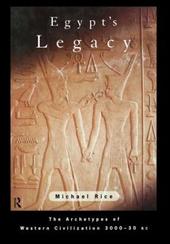
|
Egypt's Legacy: The Archetypes of Western Civilization 3000 to 30 B.C.
Hardback
Main Details
| Title |
Egypt's Legacy: The Archetypes of Western Civilization 3000 to 30 B.C.
|
| Authors and Contributors |
By (author) Michael Rice
|
| Physical Properties |
| Format:Hardback | | Pages:256 | | Dimensions(mm): Height 234,Width 156 |
|
| Category/Genre | African history
World history - BCE to c 500 CE |
|---|
| ISBN/Barcode |
9780415157797
|
| Classifications | Dewey:932 |
|---|
| Audience | | Undergraduate | | Postgraduate, Research & Scholarly | |
|---|
| Illustrations |
21 b&w photographs, references, bibliography, index
|
|
Publishing Details |
| Publisher |
Taylor & Francis Ltd
|
| Imprint |
Routledge
|
| Publication Date |
15 May 1997 |
| Publication Country |
United Kingdom
|
Description
In Egypt's Legcay , Michael Rice explains the majesty and enduring appeal of Egyptian Civilization. Drawing on Jungian psychology to show why Egypt has been so important in the history of the West. Jung claimed that there exist certain psychological drives dormant in our shared unconscious: these are the Archetypes. From the omnipotent god to the idea of the nation state, the formulation of most of these archetypes is owed to Ancient Egypt. People of the present day continue to wonder and marvel at the majesty of Egyptian art and architecture; in this book, Michael Rice sets out to recover the sense of wonder that the Egyptians themselves felt as they contemplated the world in which they lived, and the way they expressed that wonder in the religion, art and literature. He traces the story of Egyptian civilization from its emergence in the third millennium BC to its transformation following the Macedonian conquest in 30 BC.
Author Biography
Michael Rice is well-known for his work in the planning and designing of museums throughout the Arabian peninsula. He is the author of Egypt's Making (1990), which explores the origins of the Egyptian state from 5000-2000 BC.
Reviews"This exuberant book will appeal to those willing to think about history from a Jungian standpoint." - Religious Studies Review
|